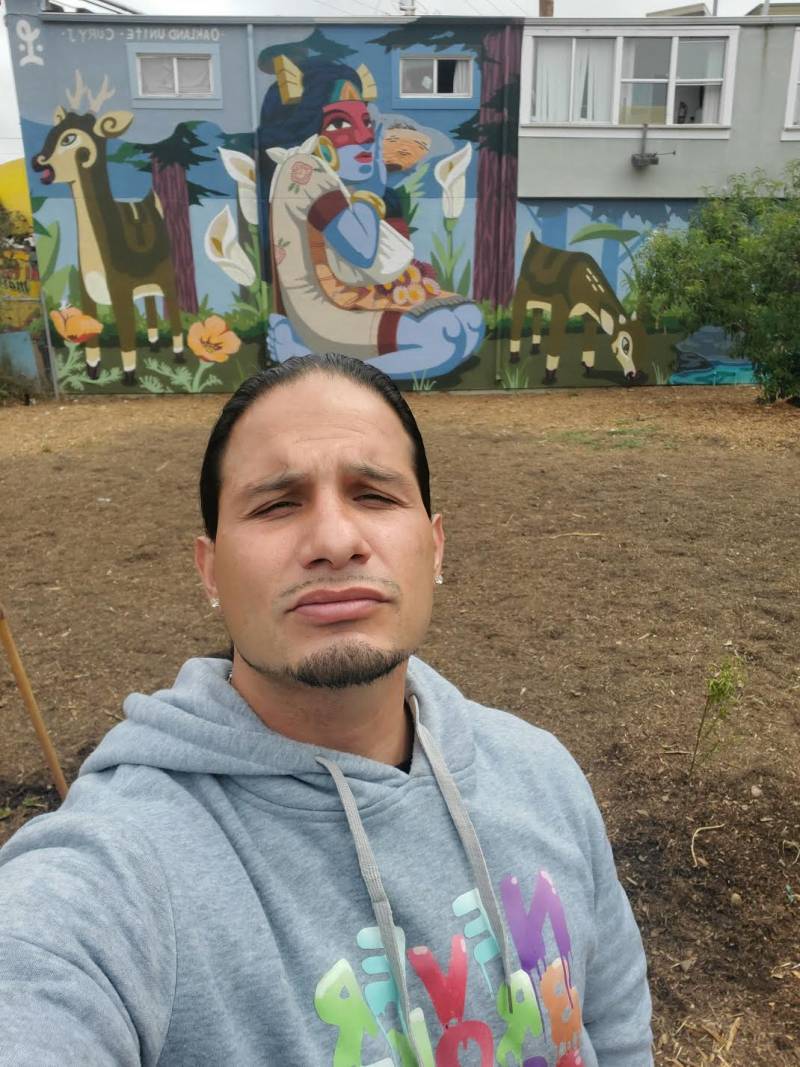
Michael Muscadine was born and raised in East Oakland’s Fruitvale neighborhood, where his family goes back several generations. Muscadine says that’s where his grandfather, John Melendrez, instilled in him the idea of community oriented social activism.
Now Muscadine works as a life coach at the Fruitvale-based nonprofit, CURYJ, which stands for Communities United For Restorative Youth Justice. Muscadine works directly with young folks– many of whom have had run-ins with the justice system– to assure that they have resources like food and housing.
Muscadine also works at a community garden in the same neighborhood where he works and lives. Through gardening, and his work at CURYJ, he’s literally planting seeds in the same place he has deep roots.
After listening to this episode of Rightnowish, read more on Michael Muscadine’s work on the California Funders for Boys and Men of Color’s “Here to Lead CA” project.
Below are lightly edited excerpts of my conversation with Michael Muscadine.
Michael: Yes, my grandfather came here, bought a house in Fruitvale in 1964. And he was very active with a lot of organizing. Working with the Panthers, working with Cesar Chavez, working with the Native American movement, working with the Chicano movement. You know, all those movements that were going through Oakland from the 60s and 70s and 80s. The work I do is because of him planting those seeds and seeing those books in the basement and seeing those posters, like Malcolm X, and I’m like, whoa. So I was always brought up with knowing somewhat of Civil Rights in my culture, being fascinated of the stories that he did tell me. And I’m thankful for having those moments in those times of just him telling me to speak up when you feel something is not right.
Pen: Can you tell me a little bit about the impact that gang sweeps had on your life and your development?
Michael: I believe this started in 2010 with the North Oakland gang injunction. And then it started and in Fruitvale in 2011 with the gang injunction.
Pen Script: The gang injunctions were a sweep of select neighborhoods by law enforcement, where they targeted the arrests of “suspected criminals.” byway of being a part of a certain neighborhood, Michael became a target. But to him, the worst run-in with the law came after a call about a family conflict, which resulted in Michael being assaulted by officers.
Michael: I think that was the straw that broke the camel’s back for me, being beat by law enforcement, harassed, kicked, sent to the hospital. Them going in my house, just seeing them, like they just had hatred, you know? I would talk shit back because I knew my rights because of my grandfather teaching me that when I was young and knowing what they can and cannot do and holding them accountable.
Michael: I met folks that were organizing against these gang injunctions. And I never seen so many people of all colors, all different backgrounds, faith, reach out to me. You know, Black, brown, Asian, white came to support me. And I’m like, damn, this is what it looks like when we all fight against the system. So I started being very vocal against the gang injunctions in Oakland and letting the city council members know, like, “hey, my past is my past. Look at my present. Don’t keep looking about five, six years back. Look at what I’m doing now as a young man.”
Pen: What’s the importance of doing the work in terms of telling your story with the Here to Lead California project with that project?
Michael: With that project, I think just telling my story for other young Native Chicano men or boys. To see someone that looks like them. Someone that represent them, that look like them, that came from the struggles that came from the same backgrounds, hardship. When I was younger, I had mentors that try to reach out to me, but they didn’t look like me. They didn’t stay in my community. They did not go through the struggles. They tried to relate. So just putting that story out there is motivating. I love to motivate folks. And even if they see me in, you know, in any way like, “Ay, damn, Mike did it, I’m gunna pull up then.” A lot of people, even my elders, tell me they’re like, “damn, Mike I thought you would of, out of all the people, you did a whole 360 cause you were–” I was like, “Was I that bad? Shit.” They were like, “Damn. We wouldn’t expect this. See what you’re doing here. We need that.”

Rightnowish is an arts and culture podcast produced at KQED. Listen to it wherever you get your podcasts or click the play button at the top of this page and subscribe to the show on NPR One, Spotify, Apple Podcasts, TuneIn, Stitcher or wherever you get your podcasts.

